Texas Gov. Rick Perry signaled Thursday that he’s for the decriminalization of marijuana use — not legalization, but the softening of punishment for pot users in the border state.
“As governor, I have begun to implement policies that start us toward a decriminalization” by introducing alternative “drug courts” that provide treatment and softer penalties for minor offenses, Perry said during an international panel on drug legalization at the World Economic Forum in Davos, Switzerland…
“Legalization is no penalty at all, where as decriminalization doesn’t necessarily mean jail time (for minor possession offenses.) It means more of a fine or counseling or some sort of program where you don’t end up in jail but in a rehabilitative program,” said Lucy Nashed, a spokeswoman for Perry.
“The goal is to keep people out of jails and reduce recidivism, that kind of thing,” she said, adding that decriminalization excludes violent offenders and dealers.
We tolerate drinking because most adults use alcohol responsibly, and by all means let’s have a debate about cannabis given how much of the country has already legalized it under the false flag of “medical” marijuana. But an honest debate would not whitewash pot’s risks.
A growing body of medical research shows that the psychoactive substance in marijuana may cause permanent cognitive damage when used by adolescents, such as impaired memory and learning. The drug can trigger psychotic episodes, especially among vulnerable late adolescents, and the price decreases and social normalization of recreational use will increase the number of underage potheads…
Very few people are incarcerated for simple possession, which makes up about 88% of arrests. There are currently about 40,000 state and federal prisoners serving time for marijuana-related convictions, and most have violent criminal histories. Most judges must be persuaded that someone is a true danger to society to sentence prison for mere drug use.
Mr. Obama is also kidding himself if he thinks drug legalization will be a boon to the poor. His own history of drug use is well known, but most users aren’t the privileged students of the Punahou School. Like all human vices, the misery of addiction is always worse for those who lack the resources and family support of the affluent.
Former Rep. Patrick Kennedy says President Barack Obama is wrong about the dangers of marijuana, saying that the drug today is not like what the president smoked in his youth…
“I think the president needs to speak to his NIH director in charge of drug abuse,” Kennedy said on MSNBC’s “Hardball” on Monday night. “[She] would tell the president that, in fact, today’s modern, genetically modified marijuana, so it’s much higher THC levels, far surpass the marijuana that the president acknowledges smoking when he was a young person.”…
“I mean, if the president feels alcohol is worse than tobacco, what’s he prepared to do? And I’ll tell you, the president won’t be able to do a thing,” Kennedy said. “Why? Because alcohol is too powerful an industry to change. And right now, we have a chance to stop another for-profit industry from targeting our public health.”
“We will end the failed war on drugs,” [Chris Christie] said, “that believes that incarceration is the cure of every ill caused by drug abuse. We will make drug treatment available to as many of our non-violent offenders as we can, and we will partner with our citizens to create a society that understands that every life has value and no life is disposable.” That is revolutionary stuff — and will be no mean feat to accomplish…
Many on the right, not least of them the editors of this magazine, have been arguing for decades that the war on drugs is a failure — National Review’s 1996 symposium on the issue was headlined “The War on Drugs Is Lost” — but despite the strength of the evidence and the moral weight of the argument, ending drug prohibition is a position that has for decades failed to gain much traction in the mainstream political debate. There has been some incremental liberalization when it comes to marijuana, but Christie’s promise is considerably more broad. Those who labor in think-tank obscurity often despair of their ideas’ ever entering general political circulation; Christie’s promise is a reminder that, though it may take years or decades, ideas matter.
Drug addiction is an unalloyed evil, a destroyer of lives and families, an invitation to unemployment, poverty, disease, and in many cases an early death. But not every evil is a matter for the police and the prisons; in the matter of drug abuse and addiction, it has taken our nation a tragically, even catastrophically, long time to begin to figure that out. Many people will dabble in drugs without ever becoming addicts, and many of those who are arrested on drug charges suffer far more from their criminal histories than they ever do from the drugs. The war on drugs has filled our prisons and contributed to the scandalous conditions therein, which should be a source of deep and abiding shame for any decent and patriotic American. There are some horrible and evil people in our prisons, but no human being deserves the treatment — from casual brutality to constant rape — meted out there.
The very same year, for example, that Colorado legalized marijuana, the Colorado Senate passed (without a single Republican vote) a ban on trans fats in schools. Are we to believe eating a glazed donut is more harmful than smoking a joint? California has already banned trans fats in restaurants statewide, but now is on the brink of legalizing marijuana statewide come November. Former New York City Mayor Michael Bloomberg supported New York Gov. Andrew Cuomo’s effort to decriminalize marijuana in New York State, while at the same time supporting a ban on extra-large sodas. A 32-ounce Mountain Dew is bad for you, but pot isn’t?
The logic is dumbfounding. For many years, health-conscious liberals have waged a deafening, public war against cigarettes. Smoking bans in public places like restaurants and bars have been enacted in states all over the country. Recently, New York City, New Jersey and several other cities and states have extended those bans to include the newest tobacco fad—e-cigarettes. Yet, when it comes to smoking marijuana? Crickets…
Unless you’re smoking something, the logic here is pretty strong. So what explains why liberals target unhealthy foods, yet turn a blind eye to a far more harmful substance? The answer is not clear, and there may not be a good answer at all. Perhaps marijuana advocates will say that they’re merely bowing to the reality that millions of Americans enjoy it despite its deleterious health effects. But the same could be said for trans fats. Rather than speculate, we should hold liberals accountable and demand that they answer publicly: If trans fats, GMOs and other dangerous substances deserve to be banned in the name of public health, then why not marijuana as well?
Now that the War on Drugs seems to be winding down — and it’s about time — we’re going to hear more about the benign effects of smoking pot when compared to the hazards of consuming alcohol. This is a longstanding talking point for legalization advocates — and for many people a handy justification to sign on to the cause. For others, it’s a way to create an equivalence between one of man’s greatest innovations and what amounts to a big waste of time…
Fortunately, we don’t drink for our health, only to it – though there are a number of studies that allege moderate intake of alcohol can be beneficial (and I choose to believe every single one of them). The social value of alcohol is immeasurable, whereas the social value of pot is negligible. Alcohol, in its countless variations, flavors, and uses, has widespread prevalence in in our rituals and social lives for a good reason.
Marijuana might have analgesic, anti-inflammatory, and anti-psychotic properties, and it may provide a fulfilling personal experience, generating euphoria or heightened sensations (also anxiety and paranoia), and chances are high nothing averse will happen if you smoke up when you’re young. But it’s doubtful you’ll ever be clinking bongs at a wedding or setting aside the Scotch to drown your sorrows with family members over a joint. That’s not only because of the stigma. Alcohol, which can be consumed, unlike pot, for the taste alone, often makes life more accessible, you more likeable, and others more bearable.
Via RCP.








Join the conversation as a VIP Member